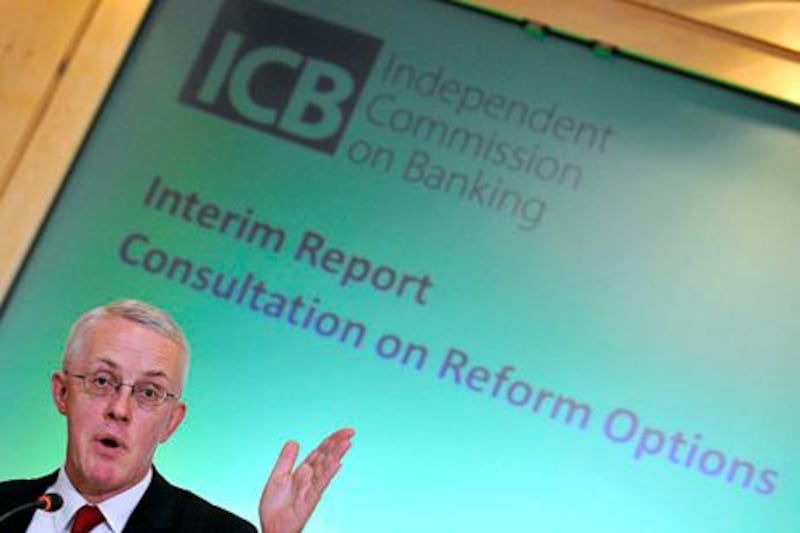LONDON // British banks should be required to insulate consumer units from their investment banks to shield customers and taxpayers from the consequences of a financial crisis, according to a government-appointed commission.
Markets Rollercoaster: More financial ups and down
Brokerages close doors as volumes hit new low Low volumes prompt renewed fears on brokerage shutdowns in the UAE. Read article
IPO starts for Oman's SMN Power, part-owned by Mubadala An Omnani power company part-owned by Abu Dhabi's Mubadala Development seeks a stock listing. Read article
Lending cools as banks become more selective A drop in personal lending contributed to credit growth retreating in July. Read article
Banks with consumer and securities units will have to separately capitalise them by 2019 under proposals made today in a 360-page report by the Independent Commission on Banking. The plans will cost as much £7 billion, the report said.
"The commission believes that ring-fencing would achieve the principal stability benefits of full separation but at lower cost to the economy," the commission said in the statement.
The government last year asked John Vickers, 53, a former Bank of England chief economist, to chair a commission considering ways to enhance competition and reduce the risks posed by the financial sector. Since 2007, the British state has been forced to spend, pledge and loan 850 billion pounds to rescue British banks, according to National Audit Office.
Chancellor of the Exchequer George Osborne welcomed the final recommendations, the government said in an e-mailed statement.
"The chancellor considers it to be an impressive report and an important step towards a new banking system that supports lending to businesses and families, supports the economy and jobs, but doesn't cost the taxpayer billions of pounds when it goes wrong," the statement. In July, Osborne said he backed the proposals following the commission's interim report.
Once the recommendations are implemented, the so-called ring-fenced units will include all checking accounts, mortgages, credit cards and lending to small- and medium-sized companies, the report said. As much as a third of U.K. bank assets, or 2.3 trillion pounds, will be included, the document said.
Trading and investment banking activities will be excluded from the ring-fence, the report said.
"Barclays will be the bank that is hit the most by this," followed by Royal Bank of Scotland Group Plc, said Shailesh Raikundlia, a banking analyst at MF Global Ltd. in London. Both London-based Barclays and Edinburgh-based RBS operate investment banks.
The commission stuck to its argument that Lloyds be forced to sell additional branches beyond the 632 required by European Union regulators. Rather than detail how this should be done, the commission recommended that the government negotiate with Lloyds to create a "strong challenger" bank.
There is "a real danger" that Lloyds's current asset programme "will fall back into the range of small banks that have not exerted a strong competitive constraint in the past," the report said.
Ring-fenced banks should have an independent board, the report said. Unless the protected part of the bank is the majority of the lender, most directors in the insulated bank should be independent non-executives, it said. The protected lender will make its own disclosures to regulators, it said.
HSBC Holdings Plc, Barclays, Lloyds, RBS, Santander U.K. Plc and Nationwide Building Society should hold more than 3 per cent extra capital, on top of the 7 per cent recommended by the Basel Committee on Banking Supervision under the so-called Basel III agreement, the report said. Cooperative Bank, Clydesdale Bank and the lender that Lloyds is selling should hold 1 per cent to 3 per cent extra.
"Smaller ring-fenced banks should have correspondingly smaller ring-fenced buffers," the report said.
The requirements should be seen as a minimum, and could be boosted by the 2.5 per cent surcharge for globally important banks, in line with Basel III recommendations, the report said.
Howard Mustoe // Bloomberg News





